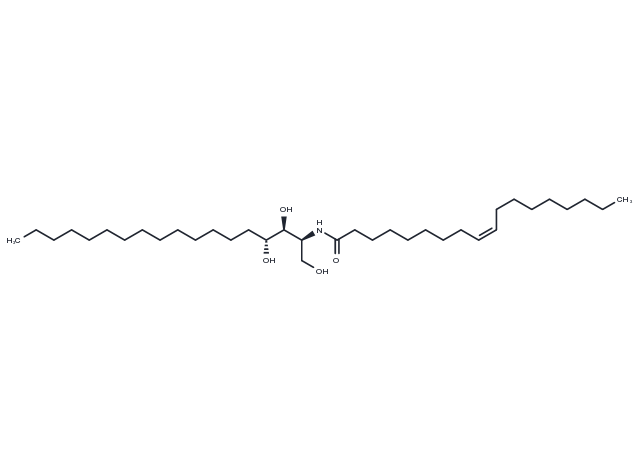Powder: -20°C for 3 years | In solvent: -80°C for 1 year


Ceramides Mixture, an endogenous ceramide, consists of hydroxy and non-hydroxy fatty acid-containing ceramides. It is involved in the regulation of cell cycle arrest, growth inhibition, and modulation of telomerase activity.

| Pack Size | Availability | Price/USD | Quantity |
|---|---|---|---|
| 1 mg | In stock | $ 32.00 | |
| 2 mg | In stock | $ 45.00 | |
| 5 mg | In stock | $ 74.00 | |
| 10 mg | In stock | $ 108.00 | |
| 25 mg | In stock | $ 178.00 | |
| 50 mg | In stock | $ 272.00 | |
| 100 mg | In stock | $ 397.00 | |
| 500 mg | In stock | $ 936.00 |

| Description | Ceramides Mixture, an endogenous ceramide, consists of hydroxy and non-hydroxy fatty acid-containing ceramides. It is involved in the regulation of cell cycle arrest, growth inhibition, and modulation of telomerase activity. |
| In vitro | Endogenous Ceramides inhibits mRNA synthesis of telomerase reverse transcriptase and telomerase activity via inactivation of the c-Myc transcription factor in the A549 human lung adenocarcinoma cell line. The sustained generation of long-chain endogenous ceramide requires the biochemical recycling of the sphingosine backbone of C6-ceramide, which involves deacylation and reacylation of ceramide for the generation of endogenous long-chain ceramide, most likely by CoA-dependent ceramide synthase, which is inhibited by fumonisin B1. In A549 cells the generation of long-chain endogenous ceramide mediates the effects of exogenous C6-ceramide on growth inhibition, cell cycle arrest, and the modulation of telomerase activity [1]. |
| Molecular Weight | 581.967 |
| Formula | C36H71NO4 |
| CAS No. | 100403-19-8 |
Powder: -20°C for 3 years | In solvent: -80°C for 1 year
Methanol: < 1 mg/mL (insoluble or slightly soluble)
Ethanol: 1mg/ml(1.72mM), Sonification and heating for 30 minutes are recommended.
H2O: < 1 mg/mL (insoluble or slightly soluble)
DMSO: < 1 mg/mL (insoluble or slightly soluble)
Chloroform: 7.69mg/ml (13.2mM)
You can also refer to dose conversion for different animals. More
bottom
Please see Inhibitor Handling Instructions for more frequently ask questions. Topics include: how to prepare stock solutions, how to store products, and cautions on cell-based assays & animal experiments, etc.
Ceramides Mixture 100403-19-8 DNA Damage/DNA Repair Telomerase inhibit permeability transcription CoA Golgi Inhibitor mRNA c-Myc lipid cell-cycle barrier Endogenous inhibitor
